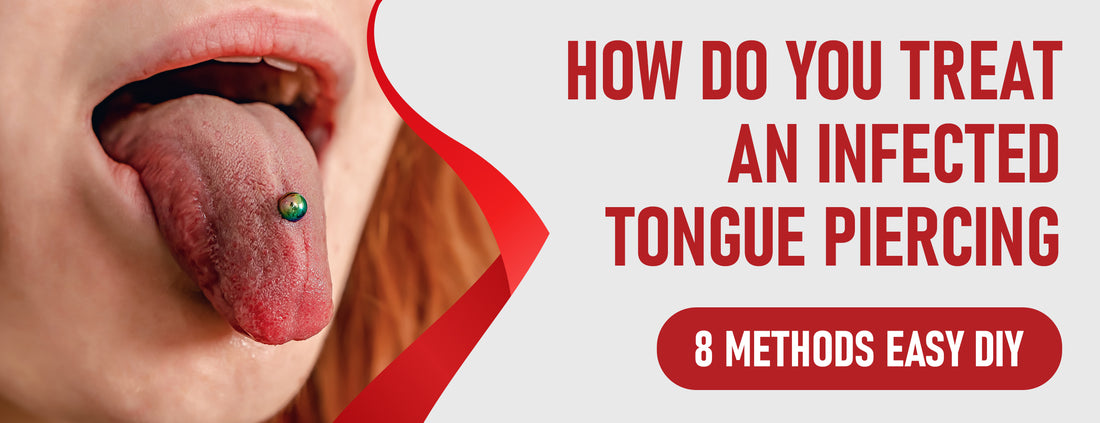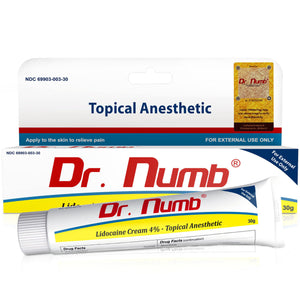Tongue-piercing infections can cause discomfort and lead to health complications. Bacteria entering the piercing can multiply under the skin, worsening the condition if left untreated.
In rare cases, it can affect oral health and overall well-being, potentially leading to more severe diseases like blood poisoning or heart problems. Proper care is crucial to prevent these complications.
The most conservative treatment options for minor local infections are warm compresses and topical antibiotics, such as bacitracin and mupirocin. Oral antibiotics like cephalexin or clindamycin may sometimes be prescribed for streptococcus and staphylococcus bacteria.
This blog post will discuss the various treatments and tips for preventing infected tongue piercings.
How Do You Treat an Infected Tongue Piercing: 8 Effective Methods

A tongue piercing enhances your style and gives you confidence. However, along with that, there's a potential risk of getting infections. These infections are painful and can leave a permanent scar on your tongue. You wouldn't want to compromise on any treatment to ease this mess. So, let's explore a few effective treatments for an infected language piercing.
Clean the Area Properly
Cleaning the piercing area is the step toward treating an infected tongue piercing. You can select one of the following methods for proper cleaning:
- Using a Pre-Made Saline Solution: A pre-made saline solution can be easily bought from medical stores and is ideal for healing most infections. It cleanses the area while reducing the swelling around the piercing.
- Creating a DIY Sea Salt Solution: One can also make a DIY sea salt solution for cleaning the piercing area. Mix 1/4th teaspoon of sea salt with warm water and rinse your mouth with it.
Avoid Touching Your Piercing
Touching your tongue piercing unnecessarily can only make matters worse. Therefore, it is always advisable to use the following methods of cleaning:
- Proper Handwashing Techniques: Always wash your hands with antibacterial soap thoroughly and adequately before cleaning your piercing.
- Using Cotton Buds or Pads For Cleaning: Use a clean and damp cotton pad or bud to clean the piercing area to avoid bacterial contamination.

Medications for Infected Tongue Piercings
In case your infection worsens, you can opt for medication-based treatments such as:
- Antibiotics: If your disease shows signs of bacterial overgrowth, antibiotics can act as a significant change. However, antibiotics might have side effects like stomachache, nausea, or vomiting. Consult your piercer or a doctor before taking any medication.
- Antifungal and Antiviral Medications: Infections like thrush, caused by fungus, or viral infections like herpes, require antifungal and antiviral drugs, respectively.
Maintaining Proper Oral Hygiene
An infected tongue piercing is often caused by bacteria buildup, which can be prevented by proper oral hygiene. These tips will help keep your penetrating clean and healthy:
- Rinse your mouth with a saline solution twice to thrice daily.
- Keep your teeth and tongue clean twice a day by brushing gently.
- Avoid using mouthwash, alcohol, or hydrogen peroxide as they may irritate the piercing.
- Try using a mild toothpaste free of dyes, fragrances, and fluoride.
Avoid Touching Piercing

Avoid touching your piercing, as it can introduce bacteria and irritate the wound. Here are some tips to avoid touching the piercing:
- It is essential to wash your hands thoroughly before cleaning or touching the piercing.
- Avoid smoking, as it can irritate the piercing and introduce bacteria.
- Avoid playing with the piercing or changing the jewelry until it is entirely healed.
- If you need to clean the piercing, use a clean cotton swab or tissue instead of your fingers.
Steering Clear from Alcohol and Tobacco
Alcohol and tobacco are known irritants that delay healing and raise infection risks. Here are a few tips to steer clear of alcohol and tobacco:
- Avoid drinking alcohol for the first few days after getting a piercing.
- Tobacco products are inferior for wounds because they irritate them and slow down their healing.
- If you must smoke, use a non-nicotine vaporizer or an oral tobacco-free product.

Seeking Medical Attention
If your piercing has been infected, it is essential to seek medical attention. Here are a few warning signs that show you need medical care:
- Swelling, redness, or discharge around the piercing.
- Pain or tenderness in the piercing area.
- A fever or chills.
- Swollen lymph nodes in the neck.
Avoid Oral Sex
Oral sex can increase the risk of infection, making it vital to avoid it until your tongue piercing has fully healed. Here are some tips:
- Refrain from engaging in oral sex until your piercing has healed.
- Ask your partner to practice proper oral hygiene to reduce the risk of infection.
2 Tips for Preventing Infected Tongue Piercings

Choosing a Reputable Piercing Studio
A safe and successful piercing experience depends on choosing the right piercing studio. Consider these factors:
- Look for a piercing studio that has experienced piercers. Doing so can minimize the risk of a botched or unsanitary piercing.
- Make sure the studio follows proper sterilization procedures, such as using an autoclave for sterilization and disposable needles.
- Check for any licenses or certifications and reviews from previous customers.
Regular Checkups and Upkeep
Going for regular checkups can ensure the health and well-being of the piercing. Here are some things to remember:
- Visit your piercing professional regularly to get your piercing checked for any signs of infection or irritation.
- If you notice any symptoms of infection, such as redness, swelling, and pus, consult your piercing professional immediately.
- Take care when changing the piercing jewelry. Ensure you use only sterilized jewelry and avoid removing it for extended periods.

Conclusion
An infected tongue piercing can be a literal and figurative pain. But with the proper treatment and aftercare, it can be quickly resolved. Always take precautions when choosing a piercer and follow their aftercare instructions thoroughly.
It's essential to listen to your body, and if you suspect there is an issue with your piercing, seek medical attention immediately. Keep your piercing clean, and ask your piercer or healthcare professional questions. With proper care, you'll show off your new piercing soon.








